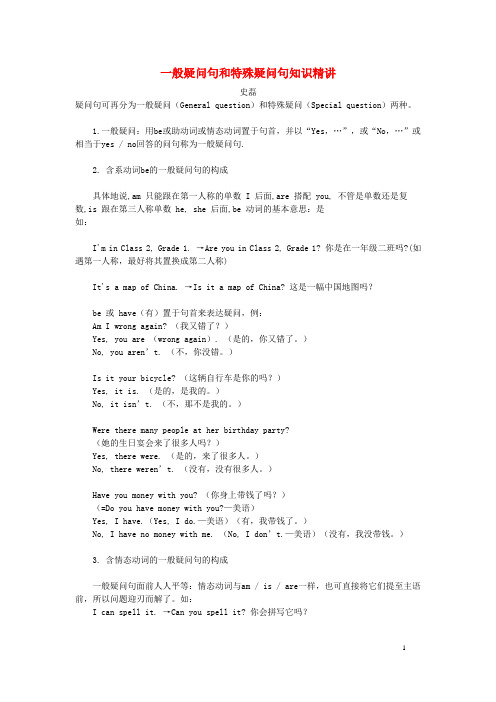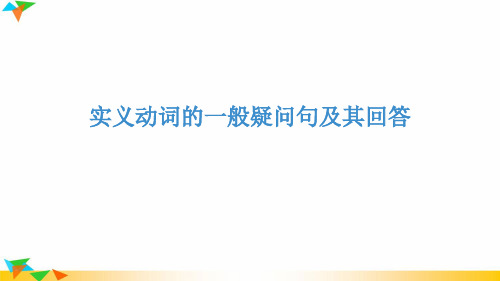实义动词一般疑问句
一般疑问句回答要注意哪四条

一般疑问句回答要注意哪四条一般疑问句有两个家族。
第一家族为含be动词或情态动词的一般疑问句,其结构为:be 动词+ 主语+ 其它部分+?情态动词+ 主语+ 动词原形+ 其它部分+?肯定回答用"Yes,主语+be\情态动词.",否定回答用"No,主语+be\情态动词+not."。
be或情态动词和not可用缩写形式,主要有isn't,aren't,wasn't,weren't,can't,mustn't,needn't等。
Eg.1 问句: Is this your English book?肯定回答: Yes,it is.否定回答: No,it isn't.Eg.2 问句: Are these your English books?肯定回答: Yes,they are.否定回答: No,they aren't.Eg.3 问句: Can you speak English?肯定回答: Yes,I can.否定回答: No,I can't.注意例句1和例句2,在回答时必须将this/that与these/those分别变为it和they。
另一家族为含行为动词(或称为实义动词)的一般疑问句,其结构为:助动词+ 主语+ 动词原形+ 其它+?肯定回答用"Yes, 主语+ do\does.",否定回答用"No, 主语+do\does not."。
助动词也常用缩写形式,主要有don't,doesn't,didn't等。
Eg.4 问句: Do your parents like English?肯答: Yes,they do.否答: No,they don't折叠一般疑问句的回答正如前面所述,回答一般疑问句时有肯定回答和否定回答两种方式,肯定回答以Yes起句,否定回答用No开头。
一般疑问句和特殊疑问句完整版

一般疑问句和特殊疑问句集团标准化办公室:[VV986T-J682P28-JP266L8-68PNN]一般疑问句与特殊疑问句Date:_______ name:_______一、【一般疑问句】1. 定义:用be、助动词或情态动词置于句首,并以“Yes,…”,或“No,…”或相当于yes / no回答的问句称为一般疑问句.2. 含系动词be的一般疑问句的构成:Be +主语+其它注意:am 只能跟在第一人称的单数 I 后面;are 搭配 you,不管you是单数还是复数;is 跟在第三人称单数 he, she, it后面Eg: I'm in Class 2, Grade 7.→ Are you in Class 2, Grade 7 (如遇第一人称,最好将其置换成第二人称)It's a map of China.→Is it a map of China这是一幅中国地图吗3. 含实义动词的一般疑问句的构成:Do/Does +主语 + 动词原形 + 其它注意:主语为第三人称单数,谓语动词为一般现在时单数第三人称形式"v-(e)s"时,用does,并要将谓语动词变回原形(如has→have,likes→like等);有时陈述句中的some还要变作any等。
如:Eg: She lives in Beijing. →Does she live in BeijingI like English. →Do you like EnglishThere are some books on my desk.→Are there any books on your desk4. 含情态动词的一般疑问句的构成:情态动词+主语+动词原形+其它Eg: I can spell it. →Can you spell it?I will do that for her. →Will you do that for her?She can drive. →Can she drive5. 一般疑问句的应答动词保持一致。
七上unit5含实义动词的句子怎样变否定句和一般一般疑问句

实义动词一般现在时的句型
句型形式 句型结构
例句
肯定句
主语+实义动词+… He likes English.
否定句
主语+don’t /
He doesn’t like
doesn’t +动词原形 English.
疑 一般疑 Do/Does+主语+ Does he like
问 问句 动词原形+…
English?
含实义动词的句子怎样变为否定句
1. He wants to go to Beijing. He does’ t want to go to Beijing.
2. Peter lives in Chongqing. Peter does’ t live in Chongqing.
3. Lucy knows about China. Lucy does’ t know about China.
5. Jane goes to school by bike. Does Jane go to school by bike? Yes, she does. / No, she doesn’ t.
6. Kangkang helps her study English. Does Kangkang help her study English? Yes, he does. / No, he doesn’ t.
wash---w__a_s_h_e_s fix---___fi_x_e_s__ go---__g_o__e_s__
play---__p_l_a_y_s_
study---_s_t_u_d_ie_ s carry---_c_a_r_r_ie_s
一般疑问句和特殊疑问句

一般疑问句和特殊疑问句知识精讲史磊疑问句可再分为一般疑问(General question)和特殊疑问(Special question)两种。
1.一般疑问:用be或助动词或情态动词置于句首,并以“Yes,…”,或“No,…”或相当于yes / no回答的问句称为一般疑问句.2. 含系动词be的一般疑问句的构成具体地说,am 只能跟在第一人称的单数 I 后面,are 搭配 you, 不管是单数还是复数,is 跟在第三人称单数 he, she 后面,be 动词的基本意思:是如:I'm in Class 2, Grade 1. →Are you in Class 2, Grade 1? 你是在一年级二班吗?(如遇第一人称,最好将其置换成第二人称)It's a map of China. →Is it a map of China? 这是一幅中国地图吗?be 或 have(有)置于句首来表达疑问,例:Am I wrong again? (我又错了?)Yes, you are (wrong again). (是的,你又错了。
)No, you aren’t. (不,你没错。
)Is it your bicycle? (这辆自行车是你的吗?)Yes, it is. (是的,是我的。
)No, it isn’t. (不,那不是我的。
)Were there many people at her birthday party?(她的生日宴会来了很多人吗?)Yes, there were. (是的,来了很多人。
)No, there weren’t. (没有,没有很多人。
)Have you money with you? (你身上带钱了吗?)(=Do you have money with you?—美语)Yes, I have.(Yes, I do.—美语)(有,我带钱了。
)No, I have no money with me. (No, I don’t.—美语)(没有,我没带钱。
练习08 含有实义动词的一般疑问句-2020-2021学年七年级英语(仁爱版)(解析版)

练习08 含有实意动词的一般疑问句一、完成句子1.你喜欢蔬菜吗?________ you like ________?【答案】Do vegetables【详解】由句意可知,本句为一般疑问句,且时态是一般现在时;主语“you”为第二人称,动词“like”是行为动词,一般疑问句用助动词do来完成,句首首字母大写;蔬菜:vegetable,可数名词,此处应用复数形式vegetables表示类别。
故填Do;vegetables。
2.下周你想和我一起去购物吗?Do you ________ ________ ________ ________ with me next week?【答案】want to go shopping【详解】want to do sth.“想要做某事”;go shopping“去购物”。
根据“Doyou...”可知是一般疑问句,助动词do 后跟还原动词。
故填want to go shopping。
3.他在新学校每天都过得愉快吗?Does he __________ __________ __________ __________ in the new school every day?【答案】have a good time【详解】“过得开心”英文表达为:have a good time;此题为一般现在时态的一般疑问句形式,句子结构为:Does he+动词原形+其他?故填have;a;good;time。
4.放学后你有时间吗?____ _______ ________ __________ after school?【答案】Do you have time【详解】结合中文句意和语境可知,本句是一般疑问句,时态用一般现在时,主语是“你you”,需要借助助动词do构成一般疑问句,句首首字母d大写;有时间:have time,在助动词do后面have用原形。
故填Do;you;have;time。
实义动词的一般疑问句及其回答 配套课件

e.g. Lily does her homework in the evening. Does Lily do her homework in the evening?
知识讲解
如果谓语动词是原型,那么助动词应该是do,变一般疑问句时 应该将do提前。
e.g. Peter goes swimming with his father. Does Peter go swimming with his father?
实义动词的一般疑问句及其回答
知识讲解
The boy is eight years old.
Is the boy eight years old?
The boy likes animals.
?Does the boy like animals?
在一般现在时态里面,如果谓语动词是实义动词,变一般疑问句时 应将助动词do / does提前,末尾打问号。
No, they don’t.
知识小结
陈述句变一般疑问句的时候要把be动词、助动词和 情态动词等提前,末尾用问号;
一般来说,变一般疑问句时应该要把第一人称改成 第二人称;
一般疑问句的肯定和否定回答仍然要借助be动词、 助动词和情态动词,分别用yes和no进行回答。
ห้องสมุดไป่ตู้
即时练习
句型转换: 1. I play basketball every day.(变一般疑问句) Do you play basketball every day? 2. That boy helps the old woman fetch some water. (变一般疑问句)
Does that boy help the old woman fetch any water? 3. Do they go shopping every weekend? (否定回答)
一般疑问句与特殊疑问句的区别

英语语法中的一般疑问句和特殊疑问句的区别一、1.一般疑问句定义:能用yes / no回答的问句。
2. 含助动词be的一般疑问句的构成具体地说,就是当陈述句中有am /is / are时,可直接将它们提至主语前,但如遇第一人称,最好将其置换成第二人称。
如:I'm in Class 1, Grade 4. →Are you in Class 2, Grade 1? 你是在一年级二班吗? It's a map of China. →Is it a map of China? 这是一幅中国地图吗?3. 含情态动词Can的一般疑问句的构成Can可直接将它们提至主语前。
如:I can do it. →Can you do it? 你会做吗?4. 含实义动词的一般疑问句的构成含实义动词的一般疑问句,要在句首加do;如果主语为第三人称单数,要在句首加does,并要将动词变回原形(如has→have,likes→like等);有时陈述句中的some还要变作any等。
如:She lives in Beijing. →Does she live in Beijing? 她住在北京吗?I like English. →Do you like English? 你喜欢英语吗?二、一般疑问句的应答用yes / no回答如:①-Is Daming a Chinese boy? 大明是中国男孩吗?-Yes, he is. / No, he isn't. 是的,他是。
/不,他不是。
②-Can Daming speak Chinese? 莉莉会说中国话吗?-No, he can't. / Sorry, I don't know. 不,她不会。
/对不起,我不知道。
一、1.特殊疑问句定义以特殊疑问词开头,对陈述句中的某一部分提出疑问/ 进行发问的句子叫特殊疑问句。
2. 特殊疑问词结构一句话:wh-开头外加能与之结伴同行的名词; how及它的形容词兄弟姐妹们,即如:what,where,which,what class,what time,what number; how,how many,how old,how much等。
含有实意动词的一般疑问句和否定句

含有实意动词的一般疑问句和否定句一、什么叫一般疑问句?用Yes或No作答的疑问句叫一般疑问句。
含有实意动词的一般疑问句是疑问句的一种。
其结构是:助动词(do或does)+主语+动词原形+其他通常回答为:肯定:Yes,+主语+提问的助动词.否定:No,+主语+提问的助动词+not.二、陈述句变一般疑问句和否定句陈述句中只有一个实义动词,变为一般疑问句时要在句首加do或does ,主语后的实义动词用原形。
变为否定句时要在动词前边加don’t或doesn’t。
如:1、I like English.(变为一般疑问句和否定句)Do you like English?Yes,I do./No,I don’t.I don’t like English.2、They like English.Do they like English?Yes,they do./No, they don’t.They don’t like English.3、She/He likes English.Does she/he like English?Yes,she/he does./No, she/he doesn’t. She/He doesn’t like English.三、练习。
(变疑问句或否定句)1、I have a new computer.2、Do you have a basketball?3、Mr. Wang doesn’t have a hat.4、I have four tennis balls.5、Jack likes playing soccer.6、They don’t have any color pencils.7、We have a computer room.8、She has a baseball.9、Tom has a tennis ball.10、My father likes playing tennis.。
- 1、下载文档前请自行甄别文档内容的完整性,平台不提供额外的编辑、内容补充、找答案等附加服务。
- 2、"仅部分预览"的文档,不可在线预览部分如存在完整性等问题,可反馈申请退款(可完整预览的文档不适用该条件!)。
- 3、如文档侵犯您的权益,请联系客服反馈,我们会尽快为您处理(人工客服工作时间:9:00-18:30)。
实义动词一般疑问句
1•实义动词(行为动词):有实际意义,表示实际动作的动词。
2. 肯定句:主语(第三人称单数)+行为动词(三单)+名词
第三人称单数:she,he,it,名词单数,人名,不及物动词例如:
I have a pen. He has a pen.
3. 否定句:主语(第三人称单数)+don't (doesn')+行为动词+名词
例如:I don't have a pen. He doesnthave a pen.
4. 一般疑问句:Do (Does)+主语(第三人称单数)+行为动词+名词?
例如:Do you have a pen? Does he have a pen?
5. 肯否回答:Yes 主语+do (does)
No,主语+do n't (does n't 例如:Yes I do./No, I don't. Yes, he does./No, he doesn. 6. do,does称为助动词,无实际意义
例如:
1.肯定句:I have a pen cil.
否定句:I don't have a pen cil.
一般疑问句:Do you have a pen cil?
肯否回答:Yes,l do. No, I don '.
2.冃疋句:She has a schoolbag.
否定句:She does n'thave a schoolbag.
一般疑问句:Does she have a schoolbag?
肯否回答:Yes, she does. No, she does n't.
练习:
1. 我有一个飞机模型。
肯定句:____________________________________________
否定句:____________________________________________
一般疑问句:________________________________________
肯否回答:____________________________________________
2. 他有一个书架。
肯定句:____________________________________________
否定句:____________________________________________
一般疑问句:________________________________________
肯否回答:____________________________________________ 整理范本编辑word !
3. 我有一张桌子。
肯定句:____________________________________________
否定句:____________________________________________ 一般疑问句:________________________________________ 肯否回答:____________________________________________
4. 她有一个妹妹。
肯定句:____________________________________________ 否定句:____________________________________________ 一般疑问句:________________________________________ 肯否回答:____________________________________________
5. Mary有一把尺子。
肯定句:____________________________________________ 否定句:____________________________________________ 一般疑问句:________________________________________ 肯否回答:____________________________________________ 6. 他的姐姐有一个橘子。
肯定句:____________________________________________ 否定句:____________________________________________ 一般疑问句:________________________________________ 肯否回答:____________________________________________
整理范本编辑word !。
